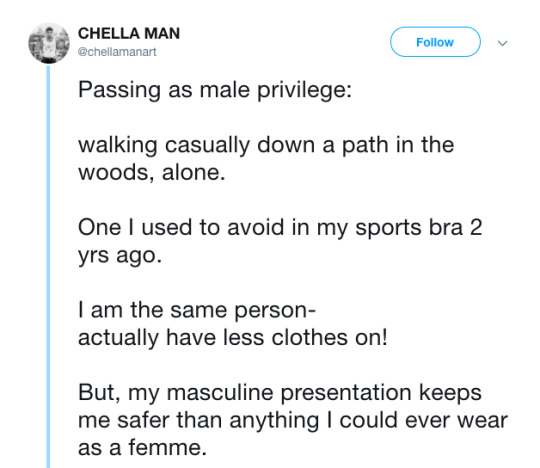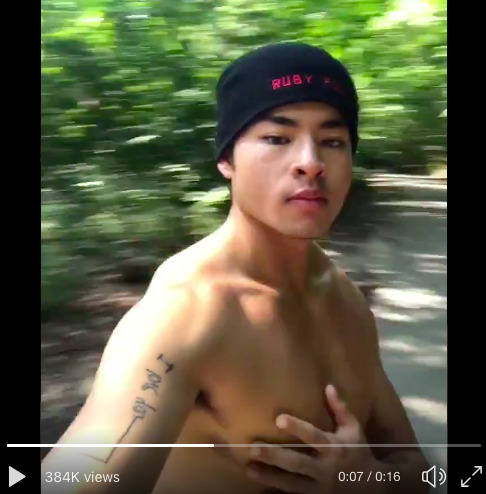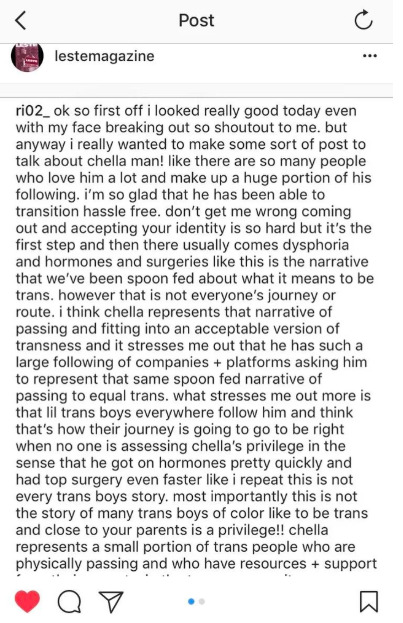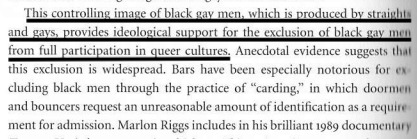#i’ve heard will wood is popular with the transgenders
Text
Update
hey guys! sorry for turning asks off, i was very busy this past week and my inbox got too full for me to manage. don’t worry, i’m definitely getting through them slowly (but surely), and i’ll be opening up my askbox again right after i make this post.
also, since this is my blog and i can technically do what i want with it, do any of y’all like will wood? if so, my friend is running a will wood song tournament at @soggytapeworm
55 notes
·
View notes
Text
More than just my bitterness about Chella Man (I promise)
There is no doubt that if your gender identification and gender presentation doesn't align with your assigned sex, you are at a disadvantage. But privilege is not a black and white kind of problem, so I pose the question: is there privilege within the genderqueer community?
In 2016, NBC published a short video on passing privilege (the first privilege I will discuss) with NBC OUT contributor Jacob Tobia.
youtube
Essentially, the idea is that transgender people who are able to pass for cisgender are granted many important privileges that others don't have access to. Some include running errands, going to the movies, or getting a haircut— or more importantly: finding employment, finding love, or finding acceptance (Tobia 00:05-00:40).
There's nothing wrong with being a person who passes for cisgender, just as there's nothing wrong with being male or white or straight. However, problems do crop up when the privileges that come along aren't addressed, particularly in the case of transgender people in the public eye.
I've discussed Chella Man once before, but I think it's important to bring him up again because he is such a well known figure among queer youth (nationally, but especially in New York City). I don't think it's dramatic to say that Man and his girlfriend (MaryV Benoit, who is straight, I might add) are two of the major faces of queer youth in America. This is fine. Man is a good role model and provides queer and transgender youth someone to look up to and admire.
However, I have to ask a question that I've posed to many, many people. Why is Chella Man, a cisgender passing, wealthy, conventionally attractive person the face of transgender youth when, for the most part, transgender people don't fit this mold?
The answer is obvious: he is a celebrity for the same reasons everyone else is a celebrity. He is handsome in a way that appeals to popular notions of beauty; he is vocal on social media; he is opinionated, well-spoken, and has a strong platform. This is fine. I don't expect celebrity culture (even queer celebrity culture) to make a 180 overnight.
However, the biggest problem I have with Man and his privilege is the fact that he has yet to address it in any meaningful sense.
I dug through his social media and appearances in mainstream media for any mention of passing privilege, and these were the two things I was able to unearth. The first is a NewNowNext Logo article by Lawrence Ferber entitled "Trans, Deaf “Titans” Star Chella Man Is the Craziest, Sexiest Superhero on TV" in which Man makes this statement:

Cool. Thanks for addressing that you pass for cis. That's step one. Step two: announcing that "we" need to work so that people who don't pass get the same opportunities that you do. Also cool.
But I'm just curious: who do you expect to do this work? Why not you? You, with the gaggles of followers and a platform where what you say is heard?
The second was a video posted to Man's twitter in which he casually discusses the privilege of being able to walk shirtless in the woods as a cisgender male-passing person. I think the tweet and video say it all.


This is less a commentary on the privilege of being cis-passing than being male-passing; he mentions how "femmes" wouldn't be safe doing what he's doing. This is true, but imagine the danger a non-passing transgender person would be in walking through the woods, shirtless. And this isn't even discussed!
I'm not the only one who feels this way about Man.
In a reddit thread started by cwilder999, this Instagram post was shared:

The most important part of what the above post is the fact that Man not only has passing privilege— he has the privilege of hormone therapy and top-surgery (which don't come cheap or without the support of one's family) and a fan base full of young trans people who think their story will follow the same easy path Man's did. Reddit user DaNkMeMeS4UNME responds with the following:

Yes, I hope so, too.
But as of yet, I have seen no action on Man's part to "uplift other trans folx? (Particularly those who don't pass)," nor any other mention of how his privilege has granted him the success and fame he holds today.
Passing privilege is only one side of the story when it comes to gender nonconformity, however.
There's an entire part of this world of queerness and queer culture that some don't feel they have complete access to— and this is where race comes into play.
Again I found myself on the blog "They Is My Pronoun" (see my earlier post here) where Anonymous posed this question:
“I love my friends who use they/them pronouns. However I have noticed that they are all white. Sometimes I think claiming these pronouns is a white privilege. Or just only a thing in white culture. Are there any resources out there that talk about race and nb [non-binary] pronouns? I want to understand better how different cultures deal with non binary folks, and how they deal with pronouns. Thank you.”
This person found that using gender neutral pronouns (GNPs) is more common among their white friends than their friends of color. Lee Airton responded by claiming that they just weren't sure. Is this just another case of privileged people (in this case white-privileged people) have more access and acceptance when putting their gender non-conformity into the public eye? Or is it more than that? One interesting concept Airton brought up was this fact:
“It’s true that singular they is an overwhelmingly Anglo-friendly if not Anglocentric way to recognize non-binary or genderqueer folks in everyday language, as this verb structure simply does not exist in many other languages.”
Not only are non-Anglo cultures less likely to be accepting of gender non-conformity, but the linguistic terminology used to express gender non-conformity suits Anglo languages better than others; like Airton says, "this verb structure, [they as a singular pronoun], simply does not exist in many other languages." Not only are non-binary people in non-Anglo cultures less accepted, they sometimes don't even have access to the terminology that is so helpful in establishing an identity. This is an issue that deserves much more investigation, but not much has been done as of yet.
The other half of this issue (less related to genderqueerness and more related to queer culture as a whole) is the idea of people of color operating in Western queer communities. In Charles Nero's Why Are All the Gay Ghettos White?, this problem is addressed with an anecdote about the television program Six Feet Under and its treatment of the black, gay character Keith.
Essentially, Nero's point is that over the course of the show, Keith's character is used to express black gay men's lack of understanding of typical gay culture and their inherent aggressive natures (239-240). This culminates in Nero's overarching claim that black gay men have always been seen as outsiders in gay culture, to the point of this startling quote (240):

This is true even today. Non-white gay people are seen as outsiders, not only in their own cultures and communities, but in the communities they join as queer people.
So the answer is clear: yes. There is evidence of severe inequalities of privilege within this underprivileged group (group being queer people). From having the money for top surgery to not having access to terminology that others have at their disposal, some queer people have advantages others do not. Even the ties that bind queer people together are severed by discriminations of class and race.
How do we solve this? I have no idea. I don't even know whose responsibility it is to fix the problem. Hopefully, those with privilege will begin to work towards making communities more accessible for all people in all intersections of life, and I'm sure some are, but I have yet to see any major addressing of this increasingly prevalent problem by those with the power, platform, and reach so far.
0 notes
Note
can you recommend some books with trans characters?
This is by no means a complete list, nor will it ever be. There are quite a few books with trans characters, and more being written every day. Feel free to add to this list if you know of other books, or let me know if one of the books on here is inappropriate/doesn’t belong.
Picture Books (there are a ton of picture books about being trans/gender non-conforming, these are some of the more popular ones):
Just as a sidenote, if you’re looking for these books in a book store (mainly Barnes and Noble), they’re probably in the parenting section.
I am Jazz
Red
Jacob’s New Dress
Stacy’s Not a Girl (I linked the indiegogo page, even though donations are now closed, but it did reach it’s goal! Also the author is really cool and just the nicest guy)
10,000 Dresses
Introducing Teddy
My Princess Boy
Children’s Lit
George by Alex Gino (author is trans, easy read and really cute story) trans girl
The Other Boy by M.G. Hennessey (author is not trans, but I really enjoyed the story and characters) trans boy
Lily and Dunkin by Donna Gephart (author is not trans, one of the main characters is trans, the other has bipolar disorder, the book is actually dedicated to Leelah Alcorn) trans girl
Gracefully Grayson by Ami Polonsky (author is not trans, I read it awhile ago and don’t remember much other than it’s very similar to George) trans girl
YA Lit (I put my opinions next to some/all of these, but I encourage people to read them despite whether or not I liked them)
Parrotfish by Ellen Wittlinger (author is not trans, main character binds w/ ACE for a while, the writing in this book is not very good at all but I love it anyway) trans boy
If I was Your Girl by Meredith Russo (author is trans, actually a really good book and I highly recommend it, there are two author’s notes in the back, one for trans readers and one for cis readers) trans girl
Beautiful Music for Ugly Children by Kirstin Cronn-Mills (author is not trans, if I remember correctly this book uses transsexual instead of transgender, which is an outdated term) trans boy
I am J by Cris Beam (author is not trans, not personally a fan of this one, the storyline confused me a lot, but it wasn’t bad) trans boy
What we Left Behind by Robin Talley (author is not trans, plot’s a bit boring in my opinion and I’ve heard a lot of mixed reviews about the portrayal of the main character, but it’s one of the only books I’ve read with a non-binary trans character) genderqueer character
Two Boys Kissing by David Levithan (author is not trans, there’s like 8 main characters and it’s from the pov of men that died during the AIDS crisis) trans boy
Luna by Julie Anne Peters (author is not trans, I hesitate to include this book because it’s from the perspective of the trans girl’s sister and includes constant misgendering and “my life is so hard because she’s trans” moments, but this book is important to LGBTQ+ YA Lit as it’s one of the first) trans girl
The Art of Being Normal by Lisa Williamson (author is not trans, I also hesitate to include this one because I just didn’t think it was very good at all, I didn’t like the story or the characters, but a lot of people really like it, so) trans girl
Jess, Chunk, and the Roadtrip to Infinity by Kristin Elizabeth Clark ( author is not trans) trans girl
Freakboy by Kristin Elizabeth Clark (author is not trans) trans girl
Symptoms of Being Human by Jeff Garvin (author is not trans) genderfluid character
Beast by Brie Spangler (author is not trans, I’ve heard there’s a little bit of transphobia) trans girl
Being Emily by Rachel Gold (author is not trans, I’ve heard some pretty good things, plus it’s the first YA book to be written from the trans person’s perspective) trans girl
Just Girls by Rachel Gold (author is not trans) trans girl
Almost Perfect by Brian Katcher (author is not trans, I’ve heard it’s pretty transphobic and can be triggering) trans girl
Happy Families by Tanita S. Davis (author is not trans) trans woman
A Boy Like Me by Jennie Wood (author is not trans) trans boy
Just as a small warning, some trans book lists have the book Adam by Ariel Schrag on it, this book is not about a trans guy, it’s about a cis guy who pretends to be a trans guy so that he can sleep with a woman.
Also, the main character in Every Day by David Levithan can be read as trans, but I personally found it hard to assign any gender identity to a consciousness(?).
(I know being intersex and being trans are two different things, but often books about intersex characters are placed into the “trans” category, so here are a couple of books with intersex characters)
Alex as Well by Alyssa Brugman (author is not trans or intersex, I personally found this book to be extremely confusing to follow and wildly unrealistic)
None of the Above by I.W. Gregorio (author is not trans or intersex)
Golden Boy by Abigail Tarttelin (author is not trans or intersex, tw for sexual assault)
Biography
Being Jazz by Jazz Jennings
Becoming Nicole by Amy Ellis Nutt
Some Assembly Required by Arin Andrews
Beyond Magenta by Susan Kuklin
Rethinking Normal by Katie Rain Hill
Redefining Realness by Janet Mock
Gender Outlaw by Kate Bornstein
#Anonymous#trans books#lgbt books#lgbtq books#parrotfish#luna#if i was your girl#george#lily and dunkin#none of the above#i am j#i am jazz#what we left behind#long post#ask#anon
17 notes
·
View notes